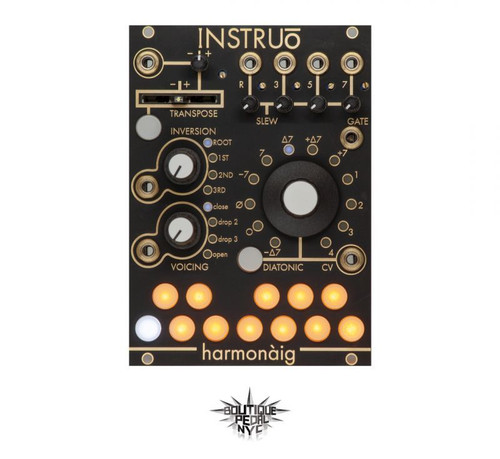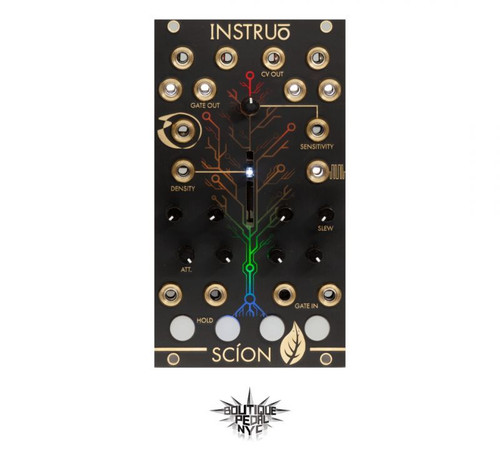Product Overview
I-ō47
Multimode Resonator/Filter
I-ō47 Multimode Resonator/Filter is a modern take on a vintage circuit design inspired by the classic 1047 module of the ARP2500. It has been designed with some extra features and quirks built in.
The internal VCA’s are a new hybrid design of matched transistors and precision op-amps.
With CV controllable centre frequency, resonance/Q and notch offset along side FM, strike and a complex dual input with wave shaping limiter, the I-ō47 is truly a filter for all occasions.
I-ō47 | ʌɪ-əʊ-ˈfɔːti-ˈsɛv(ə)n | noun (signal processing) the in’s and out’s of a classic multimode filter/resonator
Description
Size
14HP
Depth: 27mm
Power
+12V: 50mA
–12V: 50mA
Specifications
Centre frequency range 16Hz to 16KHz
1V/octave, Coarse and Fine frequency controls
FM input with attenuverter
Low pass 12 dB/octave
High pass 12 dB/octave
Band pass 6 – 12 dB/octave dependent on Q
Notch with variable offset –/+ 2 octaves
Input with gain control
Inverted input with resonance dependent gain
Strike input for pinging the filter
Feedback switch which adds BP to the input for enhances resonance
Limiter based on tanh wave shaper which affects primary input (post gain fader)
Description
I-ō47 Multimode Resonator/Filter draws its circuit design inspiration from the classic 1047 module of the ARP2500 system.
Built upon the classic circuit architecture of the original, the design was refined with extensive experimentation using modern components along side classic configurations of discrete parts.
The internal VCA’s are a new hybrid design of matched transistors and precision op-amps.
Various refinements were also added such as voltage control over the variable notch offset which opens new worlds of dynamic sweeps and shaping.
There are two audio inputs on the I-ō47. The top runs through a gain stage, set by the fader, and has an optional limiter in line with it selected by the LIM toggle switch.
This limiter is an implementation of the tanh wave shaper circuit which applies the soft curvature of the tanh expression to any input signal. The gain fader sits before the limiter allowing for precise control over the amount of warm saturation that occurs with this style of limiting.
With a simple sawtooth wave, the limiter will gently curve the ramp and result in subtle enhancement of the low end of the signal’s tone.
For more complex audio signals (drum voices work a treat!) the limiter will give very musical results akin to gentle compression/overdrive, all the way to limiting and saturation.
The inverting input inverts the polarity of the input signal. This input is also directly affected in amplitude by the Q (resonance) control. As resonance increases, the signal amplitude will decrease, acting as a form of automatic gain compensation.
Both inputs can be used simultaneously to mix two independent audio signals.
The variable Notch effectively crossfades between branches of the low-pass and high-pass signals. The result is an offset notch response that can shift up or down a couple of octaves from the centre frequency.
This part of the circuit was inspired directly from the 2500’s 1047 variable notch control.
CV was added by means of an optimised linear crossfading VCA pair. (The versatility of the variable notch output became apparent early on in development, so CV control was made a priority!)
Q (resonance) is CV controllable.
The feedback toggle sends an additional branch of the band-pass signal to the non-inverting input and allows for stable self oscillation of the Filter. It can be used to kick the resonance response up a gear.
The strike input can be used to ‘ping’ the resonance of the filter. It is designed to respond to signals at audio rate which allows for its use as an input for square wave tones.







![Instruō tanh[3] Instruō tanh[3]](https://cdn11.bigcommerce.com/s-58e73/images/stencil/500x659/products/1299/4646/20190913_cbf8d7__55397.1570594172.jpg?c=2)



![Instruō [2]f Instruō [2]f](https://cdn11.bigcommerce.com/s-58e73/images/stencil/500x659/products/1300/4647/20190913_9da3f0__47751.1570594395.jpg?c=2)